From Invocation to Benediction: Tennessee Sings Along to U2’s Stories of Experience and Innocence
May 31, 2018
Here in the so-called “Buckle of the Bible Belt,” home to around 540 churches and the main offices of major denominations but also to dive bars and honky tonks, Nashville is a study in contrasts. Houses of worship are so ubiquitous that when the Bridgestone Arena was built, the Metro Council had to grant an exemption to the ordinance regulating how far an establishment had to be from a church in order to sell alcohol.
Just outside from the Arena there lies another string of hallowed halls. From Tootsies to Robert’s Western World to Ernest Tubb’s Record Shop, Nashville’s secular temples are graced by the pantheon of country music deities singing songs of heartache, the hardscrabble lives of the rural poor both white and black, and the wicked mistress of whiskey. Across Broadway from the Bridgestone is the Ryman Auditorium, the site of the original Grand Ole Opry Radio Show; while the hockey arena may be the bigger venue, there is only one “Mother Church,” the Ryman.
When Bono raps sentimental about the short distance between Saturday night and Sunday morning, he is thinking about places like Nashville. On weekends, partiers and the dreamers descend onto lower Broadway and their late Saturdays bleed into the early morning dawn of Sunday. Then, the many churches will open their doors in hopes that a few bleary-eyed prodigals may stumble upon them.
Like many former Western territories of the early days of the nation, Tennessee is shaped by the legacy of camp meetings where itinerant preachers would come to frontier areas to preach, pray, and lead hymns. People from surrounding areas would come to the site of the meeting to camp-out and engage in the temporary community at sunset, where the darkness of the temporal would be visited by glimpses of the light perpetual. The cultural purchase once held by these regular Southern summer events have long since given way. They are in many ways the precursors of the cultural event that has taken their place, the rock concert.
Into this liminal space where the boundaries of secular and sacred collide and collapse, enter the Irish rock itinerant teachers of the musical message. U2 descended upon Music City for a night of hard-charging rock n roll, unafraid and unabashed in its explorations of the ecstatic, religious, or otherwise. Like the schizophrenia embodied in the family tree that holds both the Pentecostal snake charmer of an evangelist, Jimmy Swaggart and his cousin Jerry Lee Lewis, “rock n roll’s first great wild man,” U2’s showman careened back and forth, embodying both the sawdust of the revival tent and the beer-soaked pianos of the honky tonks.
Early in the set, Bono invited the intimate gathering of 18,500 to walk with the band on a “boy’s journey” from innocence through experience. In light of the last two albums (Songs of Innocence and Songs of Experience), we have a glimpse of where walking with the band on this journey might take us. The last two albums borrow their titles from collections of poems by William Blake, where innocence and experience themselves are already refigurations of Milton’s mythic accounts of paradise and the fall. In this primal narrative and on this late Saturday in May, the band invited those gathered to consider how and what this childhood narrative that begins in Ireland with trauma and loss (and with discovered purpose) might also mean for those gathered together that night in (and for) America, a nation as divided and cynical as it has been at any point for the last 150+ years. Perhaps together, Bono hints, “At the far end of experience, with some wisdom and good company, he (we) can recover his (our) innocence.”
While few gathered in that arena were experts in English Romantic Poets like Blake or with the intricacies of the religious and socio-political environment of Ireland during and in the aftermath of The Troubles, we still get it. Our familiarity with the Southern gospel evangelists and the dramatic effect of the “personal testimony”– this common religious imagery of everyone’s rise and fall– provided a foothold for the band to invite us beyond our disappointment and cynicism into a transformed vision. This is the key to the power of this show and the band’s latest album.
What happens after the fall? When our hopes for harmony are dashed? When our falls and failures, large and small, awaken us to our own darkness and weakness? Can we risk belief again without succumbing to magical thinking? Can we accept loss and defeat and our own finitude without crippling despair and proclaim that this is “no time not to be (fully) alive”?
The concert leans heavily on the band’s latest record, Songs of Experience, with songs from the album bracketing the rest of the set, roughly divided to open and close the show as invocation and benediction. Themes of darkness and light run rife through the album and define the show, both in song selection from the greater U2 catalogue, as well as the stunning video display and visual props. The show opens with images of an MRI brain image and vocal instructions to breathe in and exhale. The scan itself (and Bono’s elusive hints at a brush with mortality) raises intriguing questions. But looking back on the whole concert experience, we now see these breathing instructions and startling images as a corporate invitation to enter into our own personal fragility and collective interior, where darkness and mystery exist even as we face illumination.
The grand power of the second act took us into the depths of darkness both personal and collective, without providing an easily demarcated boundary between them. Earlier in the show, U2 refigures the militant call to arms of Sunday Bloody Sunday as a mournful dirge, a concession and confession that the forces of darkness are not always vanquished by the sheer force of will and passion. Before an acoustic version of Staring at the Sun, Bono reminded us that the song might be about a form of willful blindness, the kind that can destroy a nation.
Without warning, the song is accompanied by the ugly images of raw racism and xenophobia in Charlottesville and throughout the country. By the time the giant screen that runs the length of the GA area displays the two large Confederate flags waving in slow motion, the visual gut punch is followed by the lyrics’ uppercut. We find that we’re not the only ones staring at the sun, afraid of what we’d find if we took a look inside. Somewhere in this late Southern Saturday night, I can somehow hear the faint sounds of a gospel choir warming up for Sunday morning: “It’s not my brother or my sister, but me, Oh Lord, standing in the need of prayer.” Truly, middle Tennessee needs this kind of purge and prayer, no matter how difficult it is to face our demons.
As Staring at the Sun gave way to Pride and the images onscreen transitioned to civil rights marches and Black Lives Matter, it is painfully clear that those gathered (overwhelmingly white and middle-to-upper-middle-class) more closely resemble the faces shown during the previous song, rather than the latter. Will we heed the voice of a James Baldwin when he reminds us that “People who shut their eyes to reality simply invite their own destruction, and anyone who insists on remaining in a state of innocence long after that innocence is dead turns himself into a monster.” We too often find ourselves as “acrobats” who talk like this, but act like that. A moment of decision is before us. Knowing what we know from this journey of experience, can resistance be mounted and innocence be re-discovered?
On first listen to the album, I thought that the opening chords of Get Out of Your Own Way sounded like the opening of Beautiful Day, but it’s placement in the setlist, leading us toward the climax of the concert is a herald that a new dawn may be possible, despite the lack of guarantees. Kendrick Lamar’s presence on American Soul offers a peek at what might be meant by gaining wisdom and good company, as we examine the play of darkness and light in ourselves, opening up to honest communion with voices and experiences that might indict our complicity.
Like the narrative arc of the revival, we have been brought to the moment of spiritual decision, but the invitation is not given with any guarantees, no quick fixes or tickets to exit (and thus) ignore this world. Instead, the band has led us from innocence through experience, only to ask us if we can risk the hope of innocence again. This risk is a way of reading our lives in and through the messiness of experience—and through its ambiguities, losses, and failures—making a wage of faith beyond faith, without guarantee or, many days, without any rational justification for it.
The closing trio of One (Invisible snippet), Love is Bigger Than Anything in Its Way and 13(There is a Light), this sequence is one of the more subdued ends to a U2 show I have ever experienced, and because of that, and not in spite of it, it may be one of the most impactful. Before singing 13, we are reminded that this is a prayer for our children, both biological and for the larger village of youth who go on before and after us. Our own journeys have limits and calls to let go.
As Bono works his way meditatively down the catwalk to reveal and release the single bulb hidden inside the miniature replica of his Cedarwood house, we see that the grand gesture of love often seems humble and small. It is a less dramatic gesture than when he would leave the baby spotlight illuminating the arena ceilings during 40 when they closed the 1987 Joshua Tree shows, but it is no less impactful. We’re on the other side of the desert now populated by Joshua Trees and far past the searing heat of experience and doubt. We can’t go back to that time or gesture, but this show does not leave us despairing. There is too much we can’t deny. There is a darkness, both within and without. But there is a light; don’t let it go out.
Without relinquishing their respective hallowed status, but for one Saturday evening in Nashville, the Mother Church, the honky tonks, and the numerous houses of worship, these icons gave space for a revelation to occur under the tent-like roof of Bridgestone Arena. And a diminutive Irish showman, who makes up in sheer bravado what he might lack in height, this Bono and his merry band from the north side of Dublin, they invited us to the sacred places that emerge when we carry each other, despite our differences and disagreements. The promises and calls may sound like the showman is lying for a living and letting on. And, yet, it somehow—in humble, yet powerful ways—it is somehow made true when we all sing along. And we did. – Rick Quinn, Contributing Editor @apophatic1
Special thanks to Torrey Viger, Colleen Grattan, & Jeff Koss for the Nashville pictures!
“Sorry About Last Year”: U2′s Epic Return To St. Louis
May 7, 2018
A mere 8 months ago, U2 tried unsuccessfully to bring their 2017 Joshua Tree Tour to St. Louis, Missouri.
A rare occurrence for U2, the band was forced to cancel their concert after protests broke out in the city, when a white police officer was acquitted of murdering a black citizen. The large protests created a security crisis for the city, and the promoters made the difficult decision that they could not guarantee the safety of the band or concertgoers. It was a difficult day for St. Louis, for the country, and for the band and its fans.
On Friday May 4th at the Scottrade Center, Bono, Edge, Adam and Larry more than made up for the unfortunate incident of last September, with an explosive 2 hour and 15 minute set for the second stop in their eXPERIENCE+iNNOCENCE Tour.
“So glad that we’re all still here,” Bono told the very rowdy Missouri crowd as they kicked off the evening with a one two punch of Love is All We Have Left and The Blackout. “Sorry about last year.”
Apologies accepted for the thousands of fans who were treated to a journey that included a blistering All Because of You (which sounds fresh, raw, and delightful in its return to the U2 repertoire), a mesmerizing The Ocean and the psychedelic acoustic surprise of Staring at the Sun from the underrated Pop album. The rendition of the latter focused on the theme of blindness, and the accompanying videos forced all of us to reckon with the division and ugliness that currently permeates through our society in 2018.
Some fans were disappointed that the band cut a few highlights from night one in Tulsa, Oklahoma, most notably the Achtung Baby deep cut Who’s Gonna Ride Your Wild Horses, but no one was complaining after a version of American Soul that is emerging as another live highlight in the band’s storied career.
Setlists aside, the beauty of this tour thus far has been the elegance in which the themes of iNNOCENCE+eXPERIENCE interlock and overlap with eXPERIENCE+iNNOCENCE. Has there ever been a band in history that has created a two-tour narrative masterpiece where the connected parts complement each other in this way? Willie Williams and the band count on audiences having done their homework, as the tour relays the relationship between Songs of Innocence and Songs of Experience, with powerful messages of loss and light being conveyed.
A vocal minority has complained about the lack of Joshua Tree songs, including a still hard to believe omission of Where the Streets Have No Name, but when past tours have been filled with such hits for decades, it’s hard to feel bad about these changes, especially when a fan favorite rarity like Acrobat emerges instead.
In short, St Louis got a very disappointing cancellation during last year’s Joshua Tree stadium tour celebration. But the band made the delay worth the wait, as the city got treated to a tour that will likely go down in history as one of live music’s best conceptual productions ever. - Jaime Rodriguez, contributing writer – @jrodconcerts
Love & Light, Evil & Resistance at Tulsa Tour Opener
May 4, 2018
Love is all we have left, after sitting around in airports all day, trying to get to Tulsa for opening night. Love is all we have left, we will need to wake up before dawn to catch another flight to St. Louis for the second night of the tour. Love is all we have left, after all the money we will spend on this touring hobby this spring. Love Is All We Have Left, what a moving call to worship and call to action with which to begin this show!
Many of us fans travel just as hard as the band, investing crazy amounts of spiritual and financial investment into making this happen. Put “Hey I’ve been waiting to get home a long time” from Lights of Home in conversation with “You can’t return to where you’ve never left” from Cedarwood Road, and we are all just visionaries and vagabonds, finding home wherever we hang the tour lanyard. Or we are all just homebodies, traveling only in the comfort of our headphones, catching the show because of someone’s generous livestream. U2 simultaneously cultivates the rooted and the rootless in its restless but committed fanbase, and this time.
Due to the continuing emotional content, it’s not fair to call the “innocence suite,” in the first part of the show, safe or lazy. We need not compare this tour to other tours. U2 have participated in plenty of revivals of past themes on subsequent tours, it’s just that the interlocking reprises of Innocence into Experience exist in more intimate reciprocity than any precedent in the band’s touring career.
The second set shocked us though, shaking up any reticence that this tour would tame the tragic resonance of its content. By the time the crackling crunches of Vertigo gave way to Desire, we all recognized Bono was in character, and the band had descended on the small stage for a sinister and surreal circus act, a punkish pentecostal tent revival. From the shimmering sequins on his tuxedo jacket to the over-the-top tophat, Bono incorporated elements of his tortured B-movie taunts, last seen during Exit on JT30.
Before we were greeted by the return of the MacPhisto character made famous during ZooTV days, I caught traces of James Franco’s version of the Wizard of Oz. No matter who this madman was, he looked like a washed up carnival barker who had nibbled a little too much of the brown acid at Woodstock. Before going all Juggalo face with the heat of horns and hate, we got a little desperate preaching about the lusty and greedy elements of Experience. This experience is not the mature sage wisdom of middle aged rockstar do-gooder, no, but the raw confessions of a rock bottom moment, about to get sucked into a satanic salon.
When MacPhisto fully manifested his screwtape manifesto, it was even darker than the sepia-toned anti-Trump moment last summer. He snarled out his dramatic reading from the dark side: “I’ve been a busy little devil. But you’ve made it all so much easier for me these days. The truth is dead. When you don’t believe that I exist, that’s when I do my best work.” The liberal naive notion that if we pretend evil does not exist, it does not exist, is turned on its head by a man who has called himself a radical centrist; insofar for Bono, the center is God not humanity.
The short speech might make your hair stand up. These are not the happy chillbumps of Where the Streets Have No Name, but the theological recognition that evil has name and goes by many names. My name is Legion, for we are many — a stunning warning from the holy scriptures comes to mind. All this fused into a smoking live debut of Acrobat. This is one of those times when you pinch yourself, to say you were there.
Although Bono and the shows visual designers are always on-point with activist messaging, this show might have been the most adamant call back to the barricades of nonviolent resistance I have ever seen at a U2 concert. From before and throughout the show, the screens scrolled agitprop posters that suggest somebody in the U2 creative team knows that this tour falls on the fiftieth anniversary of the May 1968 uprisings in Paris. “Respect Existence or Expect Resistance” is only one of many radical memes seen on the screens.
Even though some of the overt visual references to the neo-nazis and alt-right in the show were traumatizing and triggering, they set up what might be the most riveting version of Pride in that song’s illuminated history. The band stationed themselves at the corners of a quadrilateral filling the arena floor, and the house lights went up; it was mesmerizing church in a new way, for a band that is always finding ways to make church happen in hockey arenas. It healed just a little, taking our breath away after the first part of the second half left us broken.
American Soul and Love Is Bigger Than Anything In Its Way are used as American prayers to pull U2’s adopted second country back from the precipice. We still don’t know how it is going to turn out, but Bono recited the Declaration of Independence as reverently as he recited the 23rd Psalm earlier in the show.
While last year’s stadium tour was a classic rock victory lap, this is a serious show for serious fans. The new set is a lone light bulb at the end of a dark alley, and if we participate with open hearts, the usual joy of a U2 show also wrestled with elements of grief and sadness and vulnerable uncertainty. We will be back to explore these regions of reckoning as the tour continues.
-Andrew William Smith, editor @teacheronradio
Photo credits- Desire/Macphisto by Remy from @U2Start
Bono Kneeling by Jaime Rodriguez @jrodconcerts
Full band Vertigo by Andrew William Smith
Vulnerability, Light, and the Fragility of Hope: U2′s Songs of Experience
March 18, 2018
We seem to be stuck in a moment. We are stuck in a moment where institutions we believed would provide mooring in turbulent times are crumbling. We are stuck in a moment where injustices we naively assumed were vanquished are roaring with renewed ferocity.
At this juncture, does the world need another U2 album? If your brand is soaring, sweeping exhortations of hope, what do you do when hope gets smacked in the mouth? If the moral arc of the universe is long but you believe it bends towards justice, how do you explain the harsh angles of injustice that contradict this alleged curvature? We may be one but we hurt each other. And we do it again and again.
U2 find themselves as the acting senior statesmen of rock and roll. American culture doesn’t suffer aging well. We glorify youth and stunt the maturation process by heeding the call of the sirens hawking varying forms of perpetual youth. After all, better to burn out than fade away, right?
Pop and Rock music are cultural products. All cultural productions say something about who we are and what our commitments are. They may speak to the triviality of our pursuits or the materialism that reduces our identities to constant consumers. U2’s 14th album, Songs of Experience exists as such a cultural construction, situated in multiple, overlapping contexts.
First, it is located within the U2 mythos. Despite and alongside the band’s desire to stay current and innovative, any U2 album at this point is inescapably set within the mythos of the earnest, wailing post punk band harnessing anger, hope, three chords and the truth to change the world. Or at least, as Bono puts it when he dials back the audacity just a bit, changing the “temperature” of the world. To the faithful each album is anticipated as an epistle of hope and word of protest in a world running an ever increasing deficit of justice. To the detractor, the mythos is perceived as annoying preachiness that isn’t “real” rock and roll, as if a detached ambivalence is more appropriate to the genre than the camp meeting atmosphere conjured by the band’s sweeping sonics.
This album is also situated as a companion piece to the earlier Songs of Innocence. Where SOI plumbed their roots as children of Ireland during the violence and turmoil of The Troubles, SOE ostensibly could be a meditation on how that righteous zeal forged in the crucible of violence, terror and religious fervor manifested itself throughout the band’s adulthood. This raises the more immediate context. This is a middle aged band with an eye toward the pending end of the ride, haunted by the paranoia that sometimes the end is not coming; the end is here. It is an album marked by the spectral traces of death and mortality. By now Bono’s undefined brush with mortality has been widely alluded to as a generative context for the themes and shape of this album.
It is also a reflection on and a response to Trump’s “America” and the growing boldness of racist, xenophobic right-wing movements here and abroad. It is a hefty plate to bite into but one that is almost irresistible to the grandiose ambitions of this band. As Bono has confessed, “We are always going to be that band that overreaches and we’ll take the hit for that.”
SOE is a word from and for our time, a chastened but determined realization that darkness is not defeated simply by ethereal hope divorced from messy engagement. U2 has wrestled with the contradictory and fraught relationships between the idea of America and her history. Along the way, they’ve called out to our better selves. They’ve functioned as self-appointed prophets of hope, mobilizing cathartic transcendence, striving with a critical engagement, and refusing to ignore our propensity to the darkside. After all, we are too often blind to the ways in which the hands that build can also pull down, even the hands of love.
In Rattle and Hum, they echoed Bruce Cockburn’s promise to kick the darkness until it bled daylight. For four decades now, they have swung away at the darkness, forging cracks for the light to bleed through. But 2017 reminded us of an oft-forgotten truth, the darkness kicks back hard. We can be lulled into complacency, believing that moral and spiritual progress is inevitable. But we know at an existential level that songs and slogans alone won’t save us.
During 2005’s Vertigo tour, Bono donned the “Coexist” bandana, spelled with symbols of various world religions and, echoing the famous Nietzsche quote, warned that our quest to fight monsters was often charted on the borders of becoming monsters ourselves. Americans in recent months have been slowly waking up to the realizations that the warning fell on deaf ears. We are arrogantly, flagrantly, and all too often, proudly monstrous.
In that context, Bono has appropriated Wael Ghonim’s slogan into a call and response over the last tour, “The power of the people is so much stronger than the people in power.” What words can one find in the wake of events that have led him to admit in a recent interview that the sentiment turned out not to be true? These are the Songs of Experience: laments from the recognition that darkness always gathers around the light.
It is difficult to hit the right note of balance between hope that naively underestimates the challenge of darkness and a defeatist cynicism posing as realism. Without claiming too much, it could be argued that U2 strikes this balance in partial and fragmentary measures in the mature hope given voice in SOE. This occurs in the midst of an honest recognition of the darkness that haunts our environments both macro and micro, the society at large and our inner recesses.
They succeed precisely by focusing on the antithesis of the nationalist bravado infecting our public and private spaces. Such jingoism projects a myth of invincibility, unquestioned certainty, and the elimination of doubt. Religiously, this leads to blinding pride and the ideology of the self. Instead SOE ruminates on vulnerability, mortality, ends, and failures. An authentic hope cannot exist apart from a grounding within spaces of despair. It is a realistic hope in the midst of decay akin to that given voice by a young Springsteen, “…everything dies, baby that’s a fact. But maybe everything that dies someday comes back.”
There is a trend in some Christian thought to read a concept like the resurrection in a triumphalist fashion. It is seen as a complete and total defeat of death and failure. As such, it is utopic, literally “no place.” This is why those who adhere to it gravitate toward the book of Revelation with its images of cataclysmic battles. Ignored is the aftermath of the the death of Jesus and the fear and failure of moral courage accompanying it. Oh Jesus, if I’m still your friend, what the hell, what the hell you got for me?
SOE rejects triumphalism in favor of vulnerability and, by doing so, activates a fragile but authentic hope which transcends our finite definition, but is never discoverable apart from an honest reckoning with this frailty. Any hope which emerges apart from a reckoning with our propensity to hubris and to cause harm to others is a dangerous flirtation with coercive power.
Sometimes our dreams drift from a horizon toward which we engage the world in love to an assumed certainty that finds us choosing our comfort over facing our darkness without succumbing to it. This album reckons with our reality. We are imperfect and finite beings who too often think too much of ourselves. Dreams are often dashed. And yet…and yet…endings also hide surprising beginnings. We catch the fading notes of a primordial song and we know
There is a light
We can’t always see
If there is a world
We can’t always be
If there is a dark
That we shouldn’t doubt
And there is a light
Don’t let it go out.
-Rick Quinn, Contributing Editor @apophatic1
Adam’s Humanity & Recovery Take Center Stage in Big Week for U2
July 5, 2017
When Adam Clayton strolled onto the Tree Stage at MetLife Stadium on June 28th and 29th, it wasn’t an ordinary week for the bass man, in what has been a rehearsed and routine set each night for Joshua Tree Tour 2017.
Long accustomed to being quietly appreciated for his tasty bass lines and laid-back demeanor, Adam was the toast of New York on June 26th. Celebrated by the MusiCares foundation for his recovery from alcohol addiction and for using his celebrity to help at-risk youth, Adam gave a heart-pulling and outspoken speech about his battles with alcohol, and ultimately, his conquering through surrender.
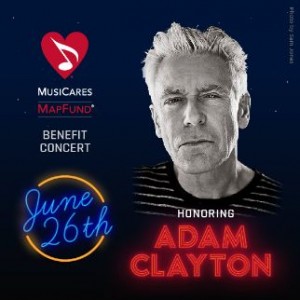
Opening-up to the intimate crowd in midtown Manhattan with his inspiring speech, Adam shared, “I was filled with fear and unable to objectively examine what was going on or see how these negative traits were holding me back.” Adam credited a varied group including Eric Clapton, Pete Townsend, his U2 bandmates, and his wife Mariana, who he says: “has never seen me drinking, but she does know me crazy.”
The evening had musical performances from artists as varied as Macy Gray, Jack Garratt, and The Lumineers who performed “One,” a song the band used to cover in bars down the street just a half decade ago. Ultimately, it was Bono, The Edge, and Larry Mullen Jr who joined their bassman for a short set including “Stuck in a Moment,” “Vertigo,” and “I Will Follow,” to close out a magical and intimate evening.
48 hours later, “intimate” was not a word that was likely on Adam’s Clayton’s mind. At 9:25 pm, MetLife Stadium busted with energy from 50,000 souls, as Adam joined his bandmates to start what would be an epic two-night stand at the New York area’s tour stops.
With the band’s wives, daughters, and best friends all in attendance—U2 came ready to play. The Joshua Tree Tour has been on the road for 18 shows since mid-May and these shows were #19 and #20, before finishing up the leg in Cleveland on July 1st. In other words, the tour is in full force now.
With an inspired Adam providing the backbone along with Larry Mullen Jr’s drums, U2 played their now traditional War-Unforgettable Fire knockout prelude to start the shows before heading to the main stage to play The Joshua Tree. “Bad” has been an emotional and appropriate part of this opening section, and in Boston on Sunday the 25th, Bono gave a special nod and dedication to Adam, in anticipation of the Monday event.
During night one, it was Bono who referred to the album as a cassette jokingly making fun of the fact that many in the audience were babies when the songs were first released. This tour has been a revelation not only for fans, but the band itself to rediscover the Joshua Tree songs live, and Bono made sure he reiterated: “It’s taken us 30 years to get to know this album, songs are mysterious things. Like an old friend, you think you know them, but then they surprise you”.
Night two, saw Adam continue the playful mood, as Bono told the intriguing story of briefly touring with an Irish band called the “Drifting Cowboys.” Per Bono’s words, this band during U2’s very early years recommended to Bono to change from rock to country to increase chances of success. Needless to say, we are lucky Bono didn’t heed that advice.
Ultimately, the show at MetLife Stadium on June 29th, culminated one of the most unforgettable weeks for Adam Clayton. And as he played the beautiful bass line to “The Little Things That Give You Away” ending one of the shows, it was us fans who are grateful to have Adam be part of our lives. -Jaime Rodriguez @Jrodconcerts




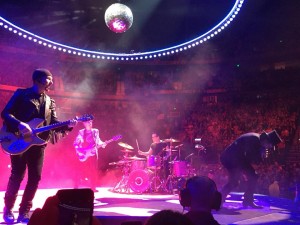
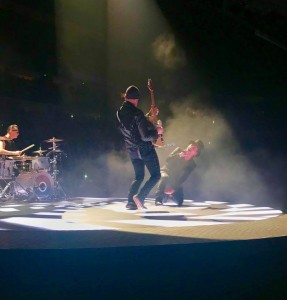
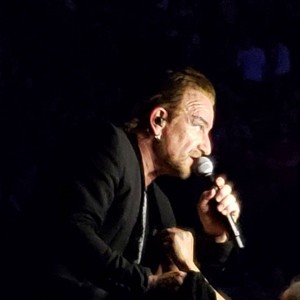
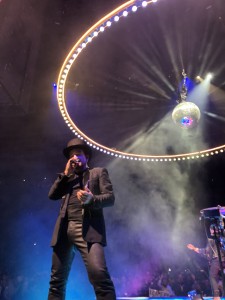
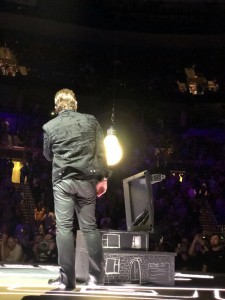
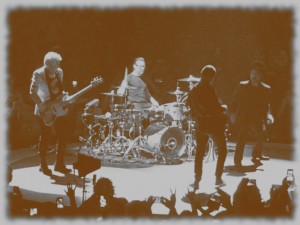
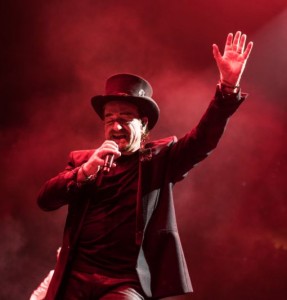

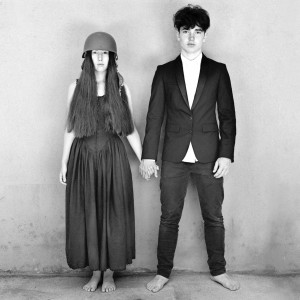
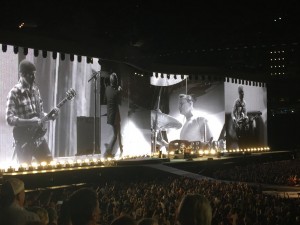
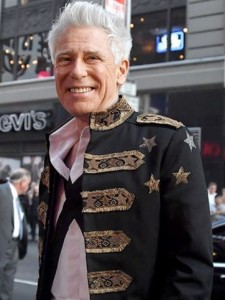
Recent Comments